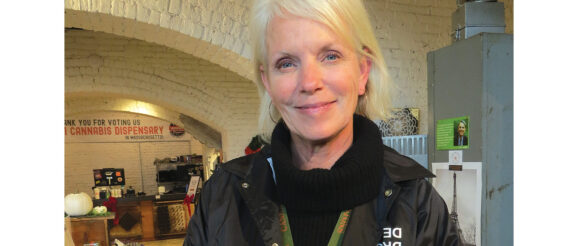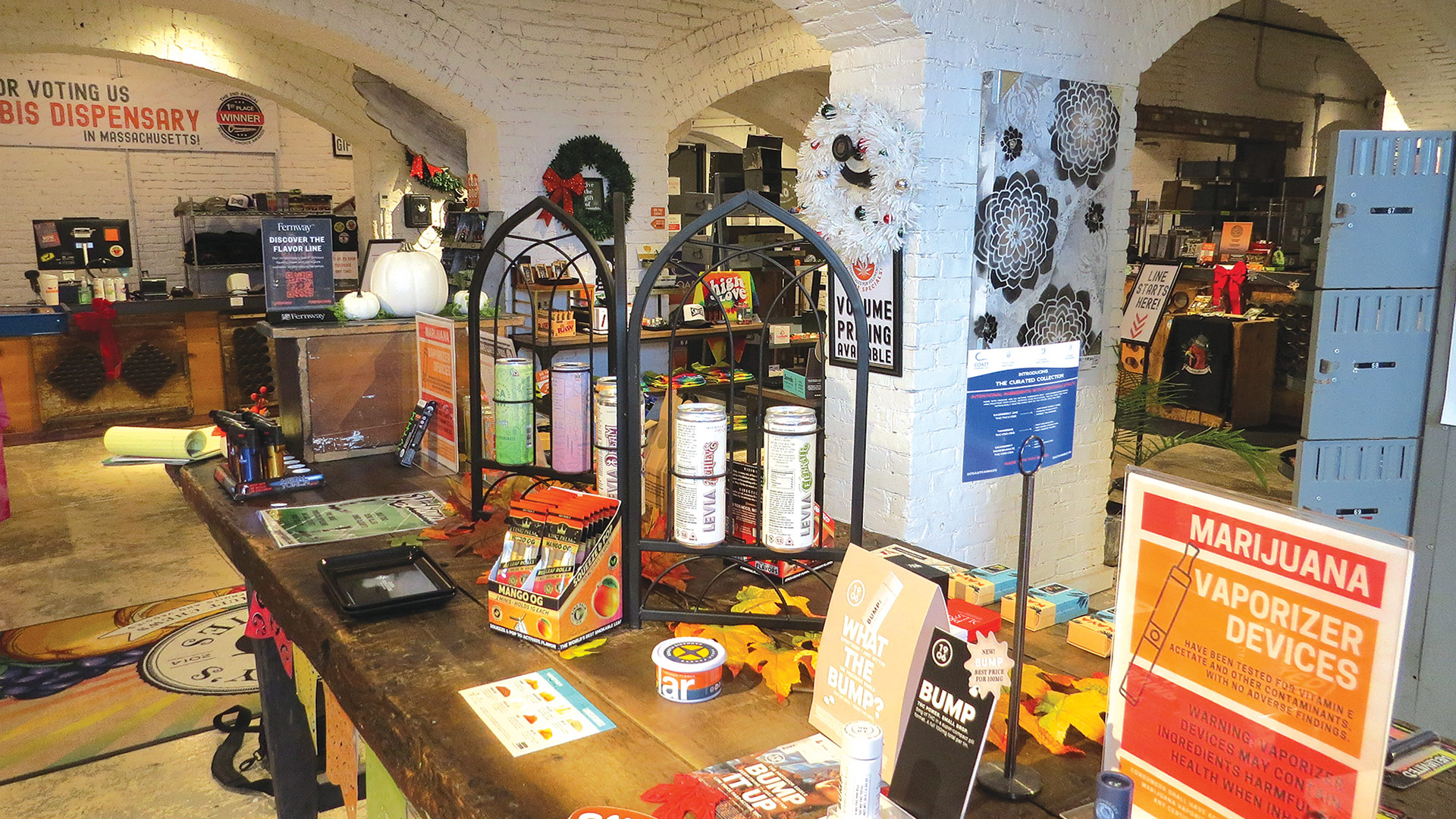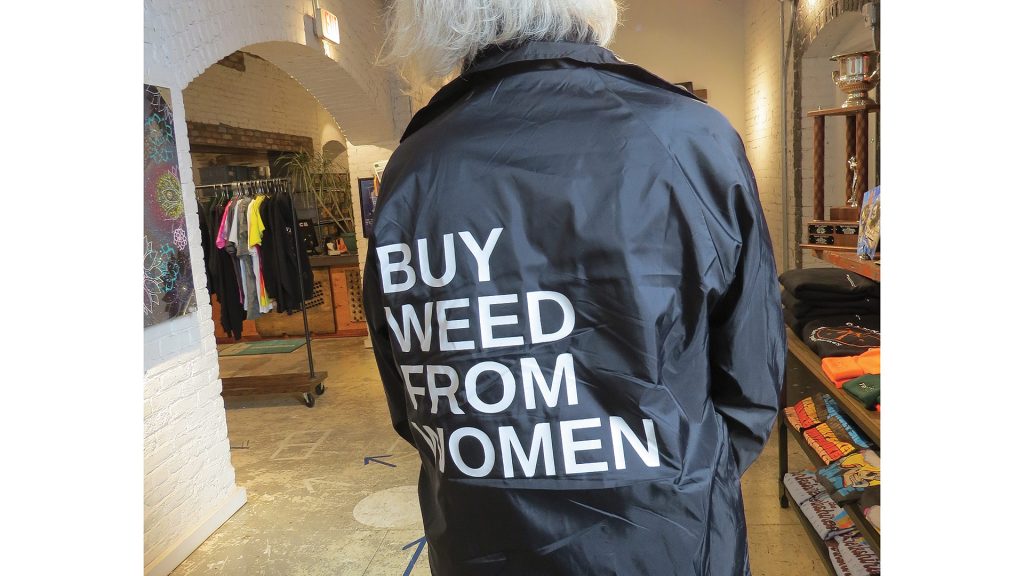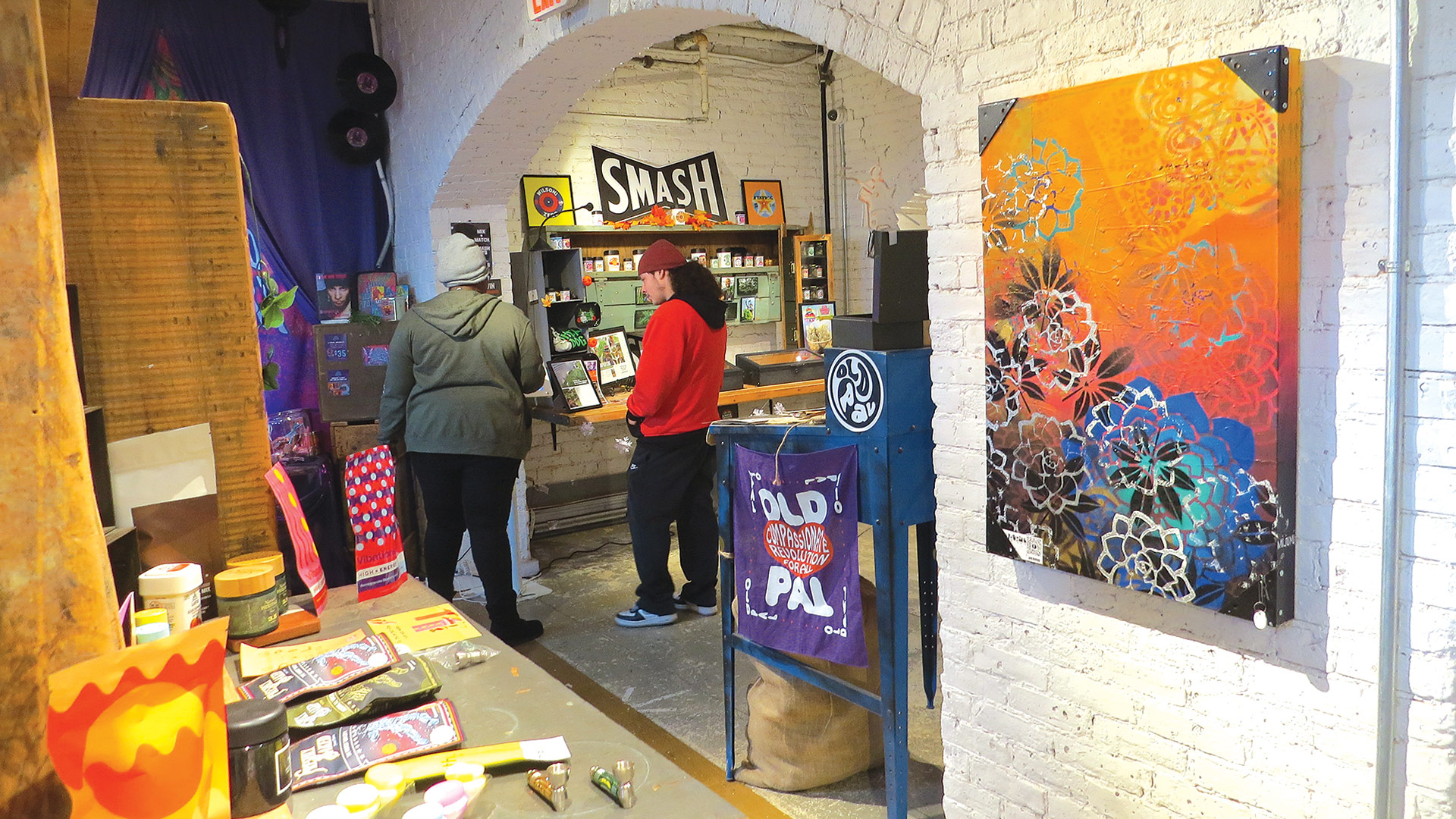Meg Sanders Infuses Energy, Innovation into Canna Provisions

Grass-roots Effort
‘Buy Weed from Women.’
That’s what is printed on the back of the coat

Meg Sanders
was wearing as she led BusinessWest on a tour of Canna Provisions’ Holyoke dispensary recently.
Those words cover a lot of ground. They’re a request, as well as a statement. They’re also an operating philosophy. And in some respects, they constitute hope for what people will be able to do more easily in the future.
Indeed, buying weed from women — as in women who own or co-own the dispensary in question — is not something easily done. The startup and operating costs for such an operation are extremely high and, for many people — and most women — simply prohibitive. And once one is in, it’s a challenge to stay in.
Sanders, CEO of Canna Provisions, is one of the rare exceptions.
She shifted her career from compliance in financial services to compliance in cannabis while living in Colorado at the time the industry was simply exploding and turning into what she called ‘the wild west.’ She is now a prominent player in the not-so-wild but very intriguing Western Mass. market, overseeing, with her partner, Erik Williams, two dispensaries (the other is in Lee) and a cultivation facility in Sheffield.
Moving forward, she envisions one more dispensary in Western Mass. — she and Williams are looking at several options for acquisition — and the buildout of another manufacturing facility in Lee. And from a bigger-picture perspective, Sanders is looking to hone a business model that will create more profitability in an industry where only a third of all busnesses are profitable.
“ I still believe the best thing in cannabis still has not been invented. We find new cannabinoids every single day; there are new ways to consume this product, new delivery methods, new formulations. Those are all really important parts of where this industry is going. Science is in it, and I am psyched to see the products we come up with to help people.”
When asked about what separates those who are profitable from those who are not, Sanders said it comes down to being smart — with everything from which products (and how much inventory) are carried to the training and development of employees.
“We invest in humans, and we train them,” she said, adding that people are the biggest and most important investment for a company in this sector.
It’s an investment she takes very seriously, and it’s one of the many reasons why she believes Canna Provisions is successful and on the cutting edge when it comes to everything from how products are displayed and sold in the dispensary to how employees are trained, groomed for advancement, and ultimately retained (more on all that later).
“I’m really proud of it — I think it’s the coolest dispensary in America,” she said of the Holyoke facility as she led the tour. “And I’ve been into a lot of them.”

Meg Sanders says Canna Provision’s dispensary in Holyoke has been designed to resemble an art gallery — and even features works from local artists.
And as she surveys the scene, at that Holyoke location and within the broad cannabis industry, Sanders, who has been quoted in publications ranging from the Wall Street Journal to Northeast Leaf, sees a number of converging forces and trends, but especially innovation, the sector’s deep impact on the local economy and the local landscape, cannabis playing a growing role in the health and wellness of people of all ages, and the promise of much more of all of that in the future.
“Cannabis is a giant vote for freedom — it’s a giant vote for ‘you know what’s best for your body; it’s not the government’s job to tell you what to put in it, on it, any of that,’” she said. “From everyone that I know that uses cannabis, customers I talk to every day, their life is better. A recent study showed that 60% of Millennials use cannabis for wellness, and when you ask them to define ‘wellness,’ it was stress, relaxation, sleep, and anxiety. The fact that people look at cannabis as wellness is huge.
“And I still believe the best thing in cannabis still has not been invented,” she went on. “We find new cannabinoids every single day; there are new ways to consume this product, new delivery methods, new formulations. Those are all really important parts of where this industry is going. Science is in it, and I am psyched to see the products we come up with to help people.”

The wording on the back of Meg Sanders’ jacket is both a request and a bit of hope for what people will be able to do more easily in the future.
For this issue, BusinessWest talked at length with Sanders about her business, her industry, the words printed on the back of her jacket, and what she expects to come next with all of the above.
Joint Ventures
That aforementioned tour of Canna Provisions came the Wednesday before Thanksgiving. It was late morning, just before noon, and the traffic in the store was still relatively light, with a handful of customers exploring the myriad product options or talking to customer-service providers, both behind the counter and on the floor.
But Sanders was expecting a huge day because cannabis, in her estimation, is becoming a growing part of Thanksgiving, especially to contend with the week’s large doses of stress.
“People will be in to get their coping mechanisms and their celebratory pieces so they can deal with Uncle Bob, who might be talking politics at the Thanksgiving table,” she explained. “We all have families, and they’re all very interesting and come with a lot of stuff; this is one way to cope, and it’s not new.”
Meanwhile, she was expecting even bigger crowds for the upcoming Black Friday and the holiday season in general. And such expectations, born from experience in both Colorado and this market, are evidence of the growing influence of cannabis — on the economy and in people’s lives.
Turning back the clock nearly 15 years, Sanders, as noted earlier, was working for a small financial-services company handling a few dozen traders when she approached a friend who was getting in on the ground floor of the exploding cannabis scene in the Centennial State and asked if he could find a place for her.
“I had definitely hit a glass ceiling — there was nowhere else to go and no more money to be made there,” she recalled. “That was happening at the exact same time as this brand-new industry was starting to explode; I reached out to my friend who was creating this cannabis business and said, ‘I’d love to help you guys; what can I do?’
“It took a while for us to find the right place, but I went basically from compliance in the financial industry to compliance in cannabis, and that’s how I got started,” she went on, adding that she became increasingly more involved and eventually become CEO.
Sanders would eventually exit that company — primarily because its board wanted to focus solely on Colorado, while she had larger aspirations for the venture — and work, along with Williams, as a consultant to states, municipalities, and individual businesses as they entered the cannabis business.
“We were helping companies and state regulatory bodies and local governments come up with ordinances that made sense, regulatory frameworks that made sense, and helping people get licensed all over, from Florida to Illinois to Nevada — everywhere,” she recalled. “And then, Massachusetts legalization happened, and we were intrigued by the model in that it wasn’t going to be this massive gaming of the system in a limited-license structure, where if you know the governor, or have the right lobbyist, or if you make donations to the right legislators, you get a license.”
Sanders and Williams eventually consulted for a venture called Canna Provisions and were invited to become part of its operations team. They became CEO and COO, respectively, and guided the company as it gained just the second license issued by the state for a standalone dispensary in Lee, right behind Caroline’s Cannabis in Uxbridge — where she bought her jacket from owner Caroline Frankel. The Holyoke facility, located on Dwight Street in a former paper mill, opened in July 2020, at the height of the pandemic.
In her role, Sanders is involved in all aspects of the business, obviously, but devotes much of her time to staff development and that broad term ‘culture.’
‘At Canna Provisions, we really believe that we’re not just growing plants and growing a business, we’re growing humans,” she explained, adding that the company invests considerable amounts of time, money, and energy to train and develop employees, and then give them opportunities to do different things and advance within the company.

Meg Sanders says Canna Provisions invests heavily in employee training and development — and the customer experience.
She said she’s currently serving as a facilitator and working with a group of seven employees at the company on a course of leadership training.
“I’m reinforcing my skills by teaching them their skills in hopes of growing humans to become better leaders, which creates happier employees,” she told BusinessWest, adding that most all of these employees have experience in business and customer service but are new to this industry.
“We work really hard to train employees, we spend a lot of money training them, and it’s ongoing,” she went on. “We’ve been told multiple times by people from this industry, and also not from this industry, that they’ve never been to a company that invests so much in training, and they appreciate it.”
Down to an Art
While Sanders is certainly well-known within the industry and probably recognized by many she encounters (especially when she shows her ID), she still calls what she does ‘secret shopping.’
These are regular visits to dispensaries across this region and beyond, during which she is always looking at the product mix, the presentation, the staff, and how they interact with customers — all with an eye toward making her own operations better and her own employees ever more responsive to what clients want and need.
“I shop everybody — everybody,” she said, “so that we’re more accurate in our differentiation. I’m able to see what competitors around us are doing, and I can say, ‘that’s one business model — it’s not a bad business model, it’s just not my business model.’”
“We’ve been told multiple times by people from this industry, and also not from this industry, that they’ve never been to a company that invests so much in training, and they appreciate it.”
These secret shopping excursions are just a small part of a broad operating formula aimed at continuous improvement, setting the bar higher, and then clearing that bar.
Sanders believes Canna Provisions does all this in all aspects of its business — from product selection to presentation, but especially with how those on the floor and behind the counter interact with and effectively serve customers, some of whom may suffer from what she called “dispensary phobia,” and a fear of going inside.
And this is a product of all that intensive — and expansive — training that Sanders talked about earlier.
“People have to be on point because your customers expect a certain level of service — they have to know the products,” she said. “It’s training and role playing and practicing and coaching on the floor — teaching them to be more aware of the people who are in front of them.
“This is not a cheap spend, “she went on. “Our average ticket here in Holyoke is close to 100 bucks a pop. When I’m spending $100 or $200 at a location, I do have a bit of expectation to be treated well.”
Overall, she likened the cannabis-buying experience, at least at her dispensaries, to jewelry shopping in many respects, from the high cost of the products to the way that many customers need guidance, or education, on what they’re buying.
Overall, Sanders believes she and Williams have created a different kind of cannabis experience in their locations. The one in Holyoke resembles an art gallery in the way products are displayed, and there are even works of art on the wall. Meanwhile, it pays homage to the property’s roots as a paper mill by putting some of the equipment and office furniture to work in displays.
Impact Statement
As she talked about the broad influence that cannabis has had on the local landscape, and will continue to have moving forward, Sanders again flashed back to the early days in Colorado, which came in 2009, the middle of what became known as the Great Recession.
“They just ran with cannabis, and it was crazy,” she said of the rapid growth of the industry and its impact on real estate, cities, towns, and individual neighborhoods. “And this started right after that massive crash and its impact on real estate and mortgages … it was a nightmare. But in Colorado, the opposite happened because all these growers, all of these dispensaries, ended up leasing more than 1 million square feet of warehouse space that had been off the tax rolls for years, just in Denver.
“So, it immediately just infused the city with vibrancy, and it happened all over,” she went on. “It was just one of those interesting economic moments where Colorado did not feel that economic downturn, the bottom dropping out, nearly as much as other states; it was fascinating. And then we kept adding all these jobs, and we kept adding jobs, and building, and then science was involved; the industry just came a long way really fast.”
It continues to grow and evolve, and now, much of what was seen in Colorado is being experienced in other states and other region, including Western Mass., she said, adding that cannabis is having a profound impact on communities like Holyoke and Lee, where she has chosen to put down roots, especially the former.
Indeed, this was a city that rolled out the red carpet for this industry, with its former mayor, Alex Morse, jokingly — although it was no joke — wishing it to become known as Rolling Paper City, a twist on its original nickname, Paper City.
Few actually call it that, but Sanders said there is no disputing the profound impact that cannabis has had in this city, where hundreds of thousands of square feet of unused or underused former mill space has been converted into dispensaries and cultivating facilities.
“Bringing more people to Holyoke is the goal for all of us,” she said. “And I think Holyoke and its bones often get overlooked; I’m so excited that there’s a new art gallery opening on High Street, that there’s several restaurants that we frequent and another new restaurant going in across the way. We have Gateway City Arts, which does concerts all the time. So, there’s momentum, and we’re hoping to be a part of that and help a city that’s been struggling for a long time.
“Together, we’re all going to make Holyoke a better place, with more jobs, more places to live, more restaurants to go to, more shopping, art,” she went on. “I absolutely love this town, and that’s why we came here and spent $1 million to open this dispensary.”
Looking ahead, Sanders wants to see a day when more women can become business owners in this sector.
“It’s very much a closed door, and the numbers are actually going down, which is unfortunate,” she said, noting, again, the sky-high costs of opening and then operating a business in this sector, and the challenge to turn a profit when 70 cents of every dollar earned is returned to the government in taxes.
“Through initiatives at the state level and maybe even at the federal level with safe banking and other things they’re talking about, we need to give minorities and women an opportunity to win alongside all the rich, white money,” she told BusinessWest. “As a female leader in this space, I am super proud to be in this space as a leader and an owner, and I would say it’s one of my biggest motivators to talk about this and do something about it.”
George O’Brien can be reached at [email protected]
The post Meg Sanders Infuses Energy, Innovation into Canna Provisions appeared first on BusinessWest.
